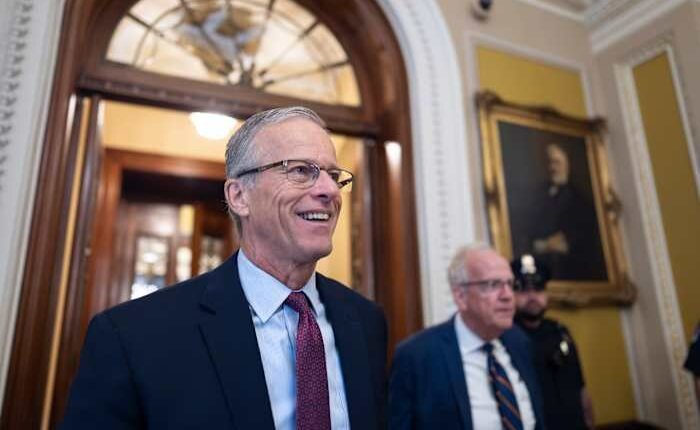Share this @internewscast.com

WASHINGTON – The Senate has officially approved 48 of President Donald Trump’s nominees in a single session, implementing new procedures to address a backlog of executive branch appointments that had been postponed by the Democrats.
Fed up with the delay tactics, Senate Republicans recently took action to simplify the process for confirming large batches of lower-level, non-judicial appointees. Democrats had insisted on voting individually for nearly all of Trump’s candidates, causing discontent among the president and occupying the Senate’s agenda.
The updated rules empower Senate Republicans to proceed with confirming groups of nominees using a straightforward majority vote, bypassing potential obstructions from a single dissent. These rules do not extend to judicial appointments or top-level Cabinet roles.
“Republicans have fixed a broken process,” Thune said ahead of the vote.
The Senate passed the confirmation with a 51-47 vote for the 48 nominees. Thune highlighted that those ratified had received bipartisan support in committee appointments, which included positions such as deputy secretaries for the Departments of Defense, Interior, and Energy, among others.
The confirmed individuals include Jonathan Morrison, stepping in as the administrator of the National Highway Traffic Safety Administration, and Kimberly Guilfoyle, appointed as the U.S. ambassador to Greece. Guilfoyle, with a background as a California prosecutor and television news figure, played a significant role in fundraising for Trump’s 2020 campaign and was previously linked to Trump’s son, Donald Trump Jr.
This recent maneuver by Thune is part of a long-standing trend spanning twelve years where both political parties have gradually undermined the filibuster to inject more partisanship into the nomination process. Historically, both parties have hindered each other’s nominations, with senators from both sides advocating for streamlining the process when they hold the majority.
Republicans first proposed changing the rules in early August, when the Senate left for a monthlong recess after a breakdown in bipartisan negotiations over the confirmation process and Trump told Senate Democratic Leader Chuck Schumer to “GO TO HELL!” on social media.
Democrats have blocked more nominees than ever before as they have struggled to find ways to oppose Trump and the GOP-dominated Congress, and as their voters have pushed them to fight Republicans at every turn. It’s the first time in recent history that the minority party hasn’t allowed at least some quick confirmations.
Senate Democratic Leader Chuck Schumer has said Democrats are delaying the nominations because Trump’s nominees are “historically bad.” And he told Republicans that they will “come to regret” their action — echoing a similar warning from GOP Leader Mitch McConnell to then-Majority Leader Harry Reid, D-Nev., in 2013, when Democrats changed Senate rules for executive branch and lower court judicial nominees to remove the 60-vote threshold for confirmations. At the time, Republicans were blocking President Barack Obama’s picks.
Republicans took the Senate majority a year later, and McConnell eventually did the same for Supreme Court nominees in 2017 as Democrats tried to block Trump’s nomination of Justice Neil Gorsuch.
“What Republicans have done is chip away at the Senate even more, to give Donald Trump more power and to rubber stamp whomever he wants, whenever he wants them, no questions asked,” Schumer said last week.
Republicans will move to confirm a second tranche of nominees in the coming weeks, gradually clearing the list of more than 100 nominations that have been pending for months.
“There will be more to come,” Thune said Thursday. “And we’ll ensure that President Trump’s administration is filled at a pace that looks more like those of his predecessors.”
Copyright 2025 The Associated Press. All rights reserved. This material may not be published, broadcast, rewritten or redistributed without permission.










